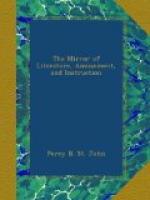“Those dark solitudes and awful cells.”
No sacred ceremonies could be performed but in the Druid’s presence: they were the guardians of religion, the interpreters of mysteries; and the foolish “cunning man” of the north, who is often consulted in these days relative to strayed cattle, intended matches, &c. is a relic of the "druidh,” the wise man of the ancient Celts.
[8] Gaelic Antiquities, p. 21.
Sun worship was the original creed; but as abuses crept in, other gods were variously introduced at the altars, Mercury being the most noted. The Druids were astronomers, and they divided time, not by the days but nights;[9] a custom as old as any with which we are acquainted, as it appears Genesis i.5: “And the evening and the morning were the first day.” Whence we say, to this day, a “se’en night”—a “fort night.”
[9] Vide Richard of Cirencester.
As the sun was the object of adoration, no wonder that mysteries were also performed to the moon, riding in silver splendour through azure space; smiling from her height upon the departed and unseen luminaries which had sunk over the distant hill, the fearful mind would watch the lamp of night as a guardian world, or deity, and in the fervour of gratitude, or under the impulse of fear, would address her as the mediatrix between man and his deity.
The chief times of devotion were at the summer solstice and the winter solstice, (whence the YULE clog), mid-day, or midnight—a zenith being their period. The new and full moon was duly reverenced. On the sixth day, a high officiating Druid gathered mistletoe; a ceremony conducted with great solemnity. It was cut with a golden knife, caught in a white robe, and not allowed to touch the ground. The shadow of this Druidical rite exists in the peculiar privileges of kissing under the mistletoe at Christmas times.
Lustrations were used, sacrifices were made, and the altar reeked, some say with human gore. The victim being dead, prayers succeeded; the entrails were examined, and certain portions were consumed upon the fire altar:
“Crepitant preces, altaria fumant.”
Intemperate drinking generally closed the sacrifice, and a fresh strewing of oak leaves reconsecrated the altar. It is remarkable that drinking—hard drinking—should have been practised by the priesthood in those remote periods, but as they were pagan heathens any animadversions can be made in safety. I cannot digress upon it. White bulls were sacrificed, and it is a singular coincidence (too striking to be the effect of chance) that white bulls were sacrificed by the Egyptians to Apis.[10]
[10] Herodotus describes the subject more minutely.
The Druids inculcated an utter disregard of death, themselves showing a good example, being ever foremost in the battle strife, urging on their countrymen to deeds of valour; not doling out their maxims in slothful indolence, and acting the reverse of their doctrine:




